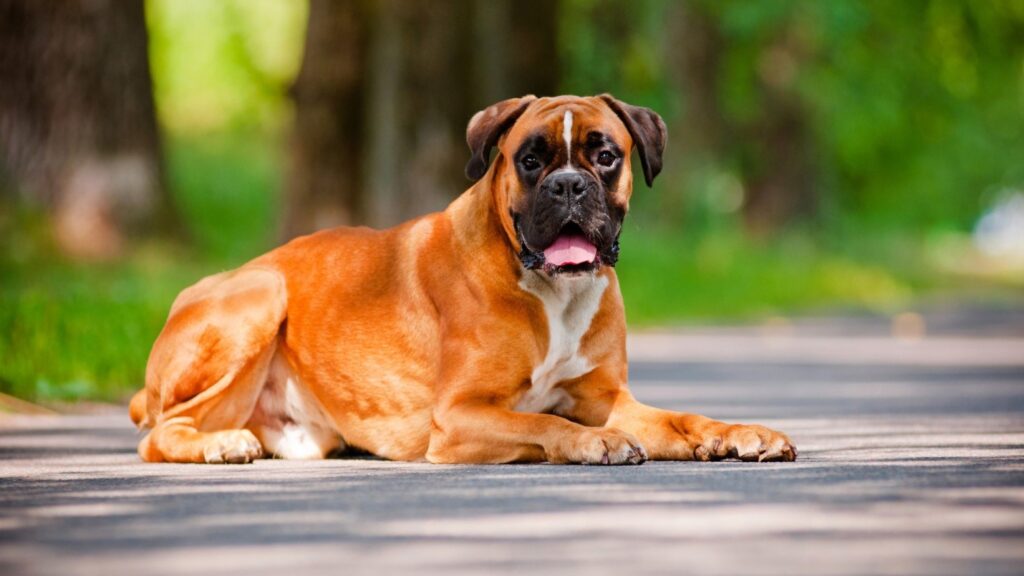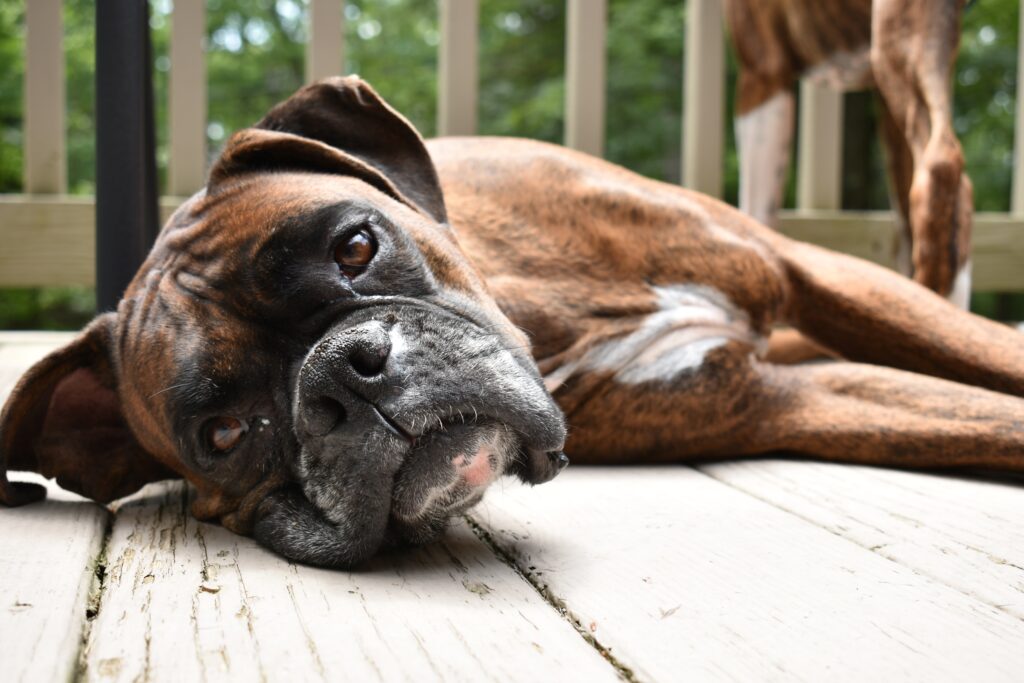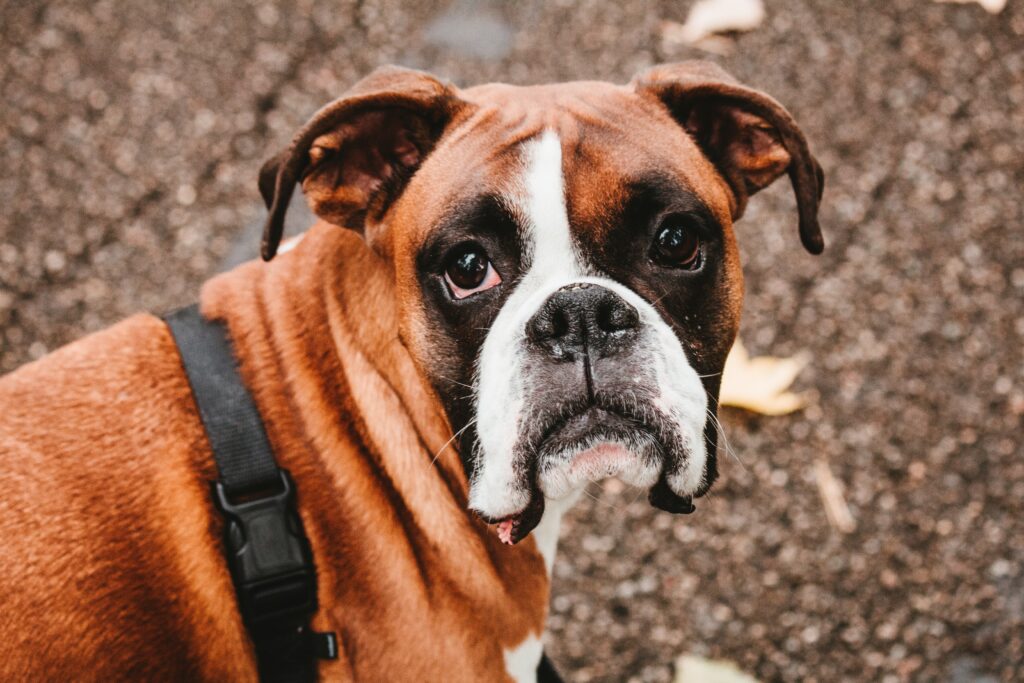Do you own a Boxer canine? You now understand dogs’ high training, intelligence, and vitality levels. Nothing makes them happier than playing and racing with their humans. But, one thing you must consider is their diet. For maximum health and vigor, your boxer dog needs a balanced diet. A healthy and best diet for Boxer dogs also aids in the prevention of conditions including obesity, joint issues, and kidney illness. Improve the health and happiness of your boxer dog with enhanced nutrients.
In this article, we will discuss in depth what your boxer’s ideal diet should look like. We will break down everything, from the type of food to the amount they should be consuming each day. So whether you have an adult or puppy boxer, read on to learn everything you need to know about feeding your pup!
Nutrient Requirements Diet for Boxer Dogs
A boxer dog has unique nutritional needs that you should be aware of before planning a diet for a boxer. The most important are protein, fat, carbohydrates, vitamins, minerals, and water. Protein is a vital nutrient for a dog and should come from quality sources like lean meats and fish. Fat provides essential fatty acids to keep your puppy’s coat healthy, while carbohydrates provide energy. Vitamins and minerals are vital for overall health and should come from fresh fruits and vegetables. Sway yourself to believe that your dog has access to plenty of clean, fresh water all day.
When choosing food for your boxer pup, it is essential to note that they need higher grades of protein than other breeds because they are prone to muscle atrophy. More importantly, ingredients like corn, wheat, or soy increase calorie intake without providing any nutritional benefits for dogs. Feeding your boxer high-quality dry kibble can also help keep their teeth and coat healthy.
Benefits of a High-Protein Diet for Boxer Dogs
A high-protein diet is vital for maintaining healthy and happy boxer dogs. A high-quality diet is prepared to meet the nutritional needs of this active breed. Below are some key reasons why a high-protein diet is beneficial to your boxer dog:

Protein helps maintain muscle mass: Protein helps keep your puppy’s muscles strong, which can be especially important if they are prone to exercise or weightlifting.
Prevents obesity and diabetes: High-protein diets can reduce the risk of obesity, which can lead to serious health complications such as diabetes.
Supports good digestion: Protein helps your dog’s digestive system function properly and can help them absorb nutrients more efficiently.
Strengthens their immune system: A proper diet rich in protein helps keep their body healthy and allows them to fight off any illnesses that may come their way.
In short, proper protein for your boxer dogs is essential for their overall well-being. Remember to add some fruits and vegetables to the mixture as well!
Feeding frequency and portion size
As the owner of a boxer, you already know that your dog needs a lot of exercise, but did you also know how important it is to improve their diet? Boxer dogs can be prone to weight gain due to their love of eating, so it is essential to ensure feeding times and portion sizes are appropriate for your puppy’s age and size.
Feeding Frequency
Adult boxers are encouraged to work out twice daily. Puppies should eat three times per day. When you notice that your dog is gaining weight, you could choose to feed it just once a day or feed it half as much twice a day.
Portion Size
When determining the correct portion size for your dog, consider the following factors: activity levels, age, metabolism rate, weight, and health conditions (if any). Adult boxers that they eat 1-2 cups of food each day. Depending on the breed, puppies may need up to 5 cups daily.
As they are designed specifically for breed size and nutritional type, you must adhere to the manufacturer’s guidelines when determining portion size. Another essential justification for measuring your puppy’s food is that overfeeding can result in obesity-related health issues.
Food Choices to Avoid With Boxer Dogs
While your Boxer pup might beg for those extra-special treats now and then, there are a few food choices that you should avoid. While some might sound like no-brainers, it is worth noting them anyway!
Human Junk Foods
We know it is tempting to give your pup a piece of that candy bar or french fry now and then, but these are definite no-nos. Most human junk foods are high in unhealthy fats and sugars, which can lead to obesity, heart disease, and other health problems. Not worth it!
Processed Foods
Avoid giving your boxer processed foods like store-bought canned food or pre-packaged treats. Most of these are packed full of additives and preservatives that can be hard on their tummies (think gas!) and cause inflammation throughout their bodies.
Allergens
Like humans, boxers can develop allergies to specific proteins in foods like wheat, dairy, and eggs. Consider switching out foods that contain allergens that cause your dog to get skin rashes or gas for more boxer-friendly fare since these proteins are often harder for the dog’s digestive system to process.
So when feeding your Boxer pup, focus on offering fresh foods like lean proteins and veggies instead of processed junk foods or things with allergens. Your puppy will thank you for it!
Tips for Transitioning to a New Diet for Boxer Dogs
Ready to transition your dog to a new diet? Here are a few tips to make sure the change goes as smoothly as possible:

- Transition gradually: Abrupt changes in diet can cause gastrointestinal distress, so introduce new foods slowly, over several days, by mixing them with their current food.
- Start with a high-quality diet: Choose one with natural, healthy ingredients like meat and vegetables and one specially designed for boxers. Avoid artificial colors, flavors, and preservatives.
- Feed regularly, but do not overfeed: Aim for two meals per day for adult boxers and four feeds for puppies or aging boxers guidelines on the packaging as a starting point and adjust if necessary based on your dog’s activity level and weight goals. And do not forget plenty of fresh water!
- Make it fun! To entice your pup to try something new, add a little extra flavor with some wet food or some healthy treats – they will be more willing to provide it a try if there is something they like mixed in!
Supplements to Enhance the Best Diet for Boxer Dogs
Supplements could be a great way to improve your boxer’s nutrition by giving them the essential vitamins and minerals not always present in regular dog food. To help keep their pets in top health, many pet owners are now turning to natural supplements like probiotics, fish oil, and glucosamine.
Probiotics
Probiotics are live microorganisms such as Lactobacillus or Bifidobacterium, beneficial bacteria that help balance your dog’s intestinal microbiome. It helps improve digestion and nutrient absorption, as well as reducing flatulence. Be on the lookout for supplements that include a variety of probiotic strains that have been through canine clinical testing.
Fish Oil
Omega-3 fatty acids, such as EPA and DHA, found in fish oil supplements are essential for having healthy skin and fur. They also improve joint health, lessen inflammation, and strengthen the immune system. For optimal effects, look for a supplement with at least 500 mg of EPA/DHA per 10 lbs of body weight daily.
Glucosamine
In many natural glucosamine supplements, joint nutrients like chondroitin sulfate, MSM, or hyaluronic acid help improve joint health. These organic supplements will help keep your boxers healthy and content for the rest of their lives!
What to Feed a Boxer Dog
Your boxer’s diet should focus on high-quality food created especially for this breed. Boxers need food high in proteins and complex carbs like grains, fruits, and vegetables because they lead a busy lifestyle.

It is crucial to remember that boxers shouldn’t overeat. Overfeeding a boxer can be a concern since they can effortlessly become overweight or obese, which can cause joint pain and other health problems. It may seem enticing, but it is not a good idea.
These are a few foods you should give a boxer to ensure they get the suitable nutrients:
- Lean beef and chicken are excellent sources of protein.
- Complex carbs such as oats, sweet potatoes, and brown rice
- Fish oil or salmon-derived omega-3 fatty acids
- Vegetables and fruits for vitamins and minerals
- Yogurt as a probiotic food
- Wholesome rewards include foods like apples or carrots (in moderation)
- Kibble was designed especially for boxers after extensive investigation
Your boxer will have the energy to keep fit and healthy while leading an active lifestyle if you emphasize a suitable diet and portion control!
Conclusion
To stay healthy and content, your boxer dog needs a balanced diet. The most crucial thing is that they require high-quality chow, suitable treats, and lots of activity. Look at their weight carefully and adjust servings as necessary. It is critical that what works for one boxer is not helpful for another. The best way to ensure your dog’s long-term health and well-being is to monitor their nutrition and make any necessary changes. Your boxer will have no trouble being content and healthy for many years with proper nutrition, regular exercise, and affection.
